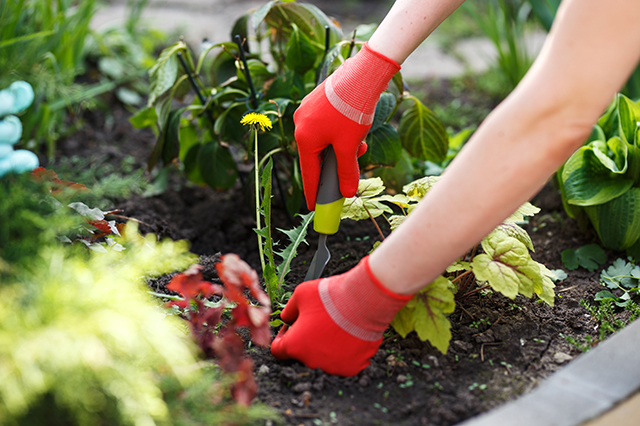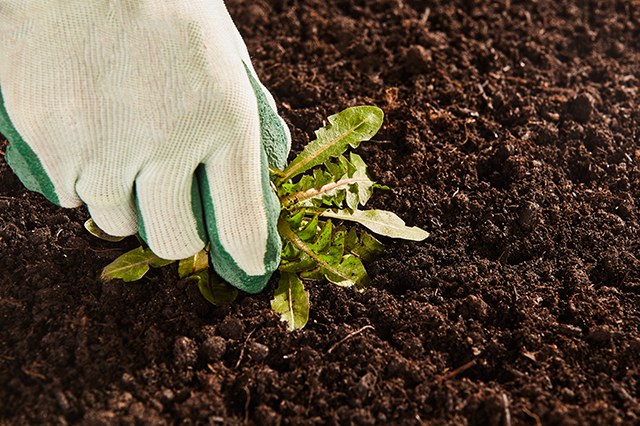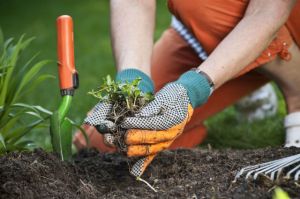Everyone wants to have the perfect lawn, and knowing how to remove weeds is essential to this goal. Weeds can also pose a problem in the garden, where they can take up space and hurt your favorite flowers or veggies. There are a number of methods you can start to implement today to eliminate these pesky weeds and have your lawn looking fresh and healthy.
Keeping your grass healthy
The first thing to remember when learning how to remove weeds is that the grass is best kept at a certain height. If you cut your grass too low, weeds will often overpower them and have a greater opportunity to grow. It’s actually a good idea to keep your grass a little longer than you would expect; essentially, the shade provided by the taller grass prevents lawn weeds from sprouting and growing. Of course, you don’t want to overdo it and keep your grass high, but rather find a middle ground. Continue to mow your grass periodically throughout the season, which can be anywhere from 2-5 times a month depending on the weather.
How to limit lawn weeds
Fertilizer can be a huge help for setting the right conditions for healthy soil and grass. Generally, you’ll want to apply fertilizer twice a year, once in the fall and spring. This will ensure that your grass grows up tall and healthy. But don’t overdo it with fertilizer application, unless you want to encourage weed growth too. You want just enough so that your grass is strong enough to defeat the weeds on their own, so be sure to read the container for proper application instructions. It’s also important to apply just the right amount of water to encourage lawn growth rather than weed growth. Your best bet is to water your lawn more occasionally, but with much more water.
The three types of lawn weeds
When learning how to remove weeds, it’s best to know the characteristics of each kind. Annual grassy weeds die each season and the seeds grow again next spring. Look out for crabgrass, which has blue-green blades and branching stems.
Broadleaf weeds are plants like dandelions and clovers that have leaves. Dandelions can grow to about a foot tall and are easily recognized by their bright yellow flowers, while white clovers have leaves with three lobes and white flowers.
Perennial grassy weeds stay dormant in winter and spread through the roots; these are usually the toughest to remove. Examples include ground ivy, which you can identify by its round bright leaves and creeping stem. Quackgrass is another common perennial with flat green leaves and strong underground stems, and it can grow up to three feet tall.

How to remove weeds with herbicides
One common way to limit lawn weed growth is through the use of herbicides. When dealing with broadleaf weeds, it’s usually not necessary to spray your entire yard; instead, focus on the small patches where strong weeds have popped up. However, remember to do some research on what brand you choose, as some herbicides can be considered toxic for children and pets who like the play in the grass, especially if you decide to spray the entire lawn. If the broadleaf weeds are still young, it should be relatively easy to pull them out manually. You can also use a daisy grubber on weeds like dandelion; this little tool is great for digging them out by their roots.
How to remove weeds manually
If you have a crabgrass infestation, you can also usually pull up most of the clumps by hand. Crabgrass isn’t a perennial weed so the root system won’t be too extensive, which makes it easier to remove. If you’d rather take preventative measures, you can apply crab grass preventer in the early spring in areas where the weed popped up last year.
For those tough perennial lawn weeds, a systematic and selective herbicide is best as it only targets the weed you want to kill and generally won’t harm other plants. If you decide to remove these weeds manually like you might with an annual or broadleaf weed, it’s a good idea to dig deep with a fork and pull them up by the roots. A winged weeder works by pushing the blade down parallel to the stem, then angling the tool downwards to pull out the entire plant by the root.
Remove weeds as early as possible
If you know these tips on how to remove weeds, you should be able to rid your lawn of any weed problem. Remember, it’s best to eliminate weeds when they’re young, regardless of the species. After all, it’s much easier to get rid of a young weed than a perennial that’s been deeply rooted for years.
Have any good weed removal tips of your own? Share them with us in the comments!
One Thought on “The Best Tips on How to Remove Weeds From Your Lawn”
Leave A Comment
Comments are subject to moderation and may or may not be published at the editor’s discretion. Only comments that are relevant to the article and add value to the Your AAA community will be considered. Comments may be edited for clarity and length.
















You made an interesting point when you mentioned that crabgrass weeds can be pulled up by hand. I would think that it would be a good idea to reduce the size of weeds before pulling them up. Mowing the weeds with a rental mower could be a good way to reduce their size.